新视野大学英语第四册教案设计Unit5
Book4unit-5 新视野大学英语读写教程第四册unit 5
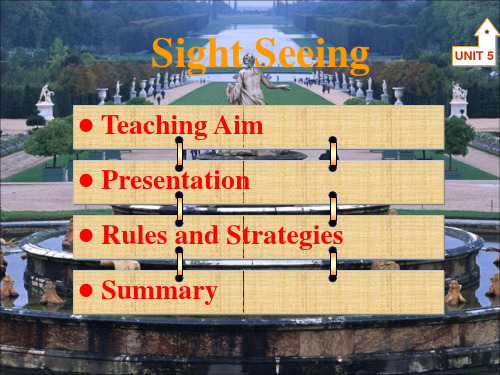
Teaching Aim
UNIT 5
Presentation Rules and Strategies
Summary
Teaching Aims
• Students could prepare a presentation about one city or special tourist attraction working in groups; • Students could present the sightseeing information about the city or the tourist attraction, and other students could acquire the information; • Students could learn the rules and strategies for presenting and translating information of sightseeing.
云南
拉萨 广西 四川 西安 湖南 洛阳 南昌 云南 湖南
龙门石窟
滕王阁 西双版纳 张家界
Scenic Spots (Chinese)
北京
北京 河南 江西
河北
Additional Vocabulary
Mogao Caves
Yellow Crane Tower
West Lake Yellow Mountain Sun Yat Sen Mausoleum
莫高窟 黄鹤楼 西湖 黄山 中山陵 孔庙 碑林 太湖 三峡 秦皇陵 泰山 大雁塔 乐山大佛
少林寺 北戴河 中山陵 颐和园 大雁塔 莫高窟
黄果树瀑布 龙门石窟 乐山大佛 九寨沟风景区 布达拉宫 武陵源风景区
新视野第四册Unit5SectionA课件
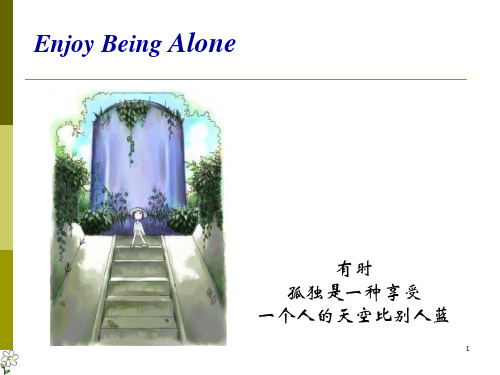
People refer to him as the high priest of science fiction.
He is widely regarded as the high priest of calligraphy.
29
While the others are absent you can stretch out your soul … (L.46)
stretch v. 1) 伸展;拉紧
stretch a rope tight stretch one’s neck / arms / legs / oneself 2) be fully stretched 竭尽所能;全力以赴 3) 滥用;曲解 stretch the law / one’s principles 4) stretch out 拉长,伸长; 躺平,舒展 The rubber band can be stretched out to twice its length. He stretched himself out on the sofa and fell asleep.
1) Para. 11: author’s comments comparison If you live with other people, … But it’s different when you live alone, …
2) Para. 12~13: it is human that we need to talk to others Who may the person living in solitude talk to?
新视野大学英语第三版读写教程第四册Unit 5 Why culture counts教案
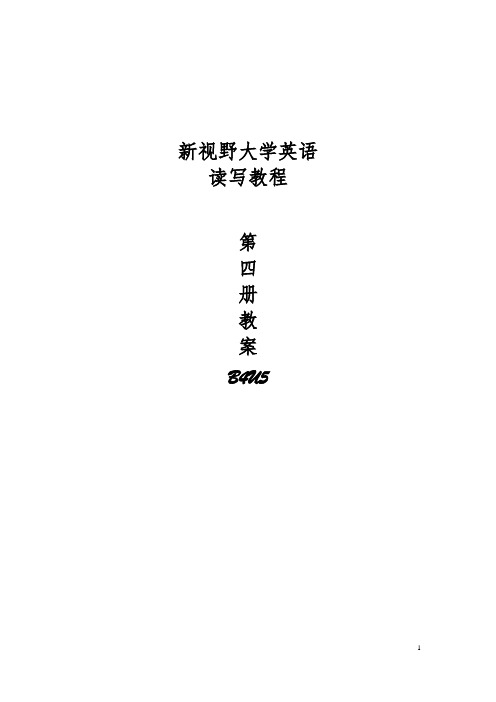
新视野大学英语读写教程第四册教案B4U5Unit 5Why culture counts*Teaching Objectives:Students will learn to use English to1. To talk about a stereotype of Chinese language and culture2. To further understand the text3. To apply the phrases and sentence patterns4. To master the paragraph (essay) writing skill*Time Allotment: each unit 8 classes1st---2nd classes: Part I Warming up1.Lead-in : Background introduction and theme-2.Understanding of the text: Detailed understanding focusincluding Topic Sentence, Key Words, Logic Words, Reading Clues etc. in order to help some questions about it.3rd--4th classes:Part II Text Study3.Reading in Depth: Structure Analysis, Summary, Difficult sentences analysisnguage Focus: More practice in Language Points (language points explanation,Sentence Patterns, Useful Expressions)5th—6th classes:Part III Reflection5.Critical thinking: More speaking practice in discussion related to stereotypes of aforeign country and how to deal with cultural differences.6.Writing Practice: Essay writing• A frustrating experience• An unforgettable experience•A difficult decision7th—8th classes: Part IV Assignment7. Post-reading activities: review words and expressions, role-play, exercises, etc8. Section B: Focus on fast reading and Practice in reading skillUNIT 5Section A Speaking Chinese in AmericaPart I Warming up1. Lead-in:1) Answer QuestionsQ1. Some Westerners think that Chinese people tend to avoid saying “no” directly. What are the common ways in which the Chinese express disagreement, rejection or refusal in daily communication?Tips: Chinese people generally use expressions like “possibly no” or “I’m afraid it won’t work” to say “no” to others. This makes them less direct in giving rejections.Q2. Are all Chinese so “discreet and modest” that there aren’t even words for “no”?Tips: No. When people with greater authority or power say “no” to those in a lower status (e.g. parents to children), they can be very direct and straightforward, e. g. “absolutely no”.2) Listen and talkListen to a radio program on compliments in American English. Complete the answers to the following questions.Q1. What are the common structures Americansuse to compliment each other?(a) What a …! (e.g. “What a nice hat!”)(b) ___________________________________(Give one structure and one example)Tips: I like your … (e.g. “I like your hat.”)I love your … (e.g. “I love your shoes.”)Q2. Are there any differences between Chinese and American cultures in how people compliment each other and how they respond to a compliment?Tips: Yes, the traditional way is to say something to show that we or the object we own is not that good. For example, we may say “哪里”(meaning “it is nothing”). But in modern days, many people have adopted the English way of responding to a compliment. They say “thank you” very often too.3) Compound dictationChina is casting such a huge __________ on the United States that many Americans are ______________ to learn the Chinese language _____________ retain their competitive edge. “Interest in learning Chinese among American youth and their parents has grown dramatically in the past five years.”said Vivien Stewart, vice president at the Asia Society, a US group trying to __________________ between Americans and the peoples of Asia and the Pacific. China’s dramatic rise to near superpower ________ and its telling effects politically, economically,and ___________ are driving the interest to learn the language, experts say. From_________________ to high schools, studies by the Asia Society show, there is a “rapid rise” in __________ among pupils to study the Chinese language.The Chinese rich cultural traditions and blossoming economy mean that is now ______________ all of our students to be better prepared to engage them and _______ opportunities together,” said Michael Levine, Asia Society’s executive director of education. Keys: shadow, scrambling, in a bid to, bridge the gap, status, culturally, kindergartens, interest, essential for, seize.2. Cultural Background: Chinese AmericansDiscuss with your partner the following questions:1) What does Chinese Americans refer to?Tips: The term “Chinese Americans” refers to Americans of Chinese descent. It also includes those with partial Chinese ancestry.2) What stereotypes of Chinese Americans are depicted in the media?Tips:·Chinese Americans are “foreign” and “unassimilated”.·Chinese are alien predators.·Chinese Americans are restricted to clichéd occupations.·Chinese Americans are polite.·Chinese Americans as a whole are a model minority.3) What are the popular columns in the history of the New York Times Magazine? Tips: Some of the popular columns in the history of the magazine are “On Language”, “The Ethicist”, “Consumed”, and “The Funny Pages”.Part II Text Study1. Global Reading:Tips for Reading: A Good Reader should1) Try to become an active reader.2) Learn to ask more questions. ( what, why, how)3) Do the efficient reading. (key points, topic sentence, key words, locatingwords, necessary and sufficient )4) Develop a habit of marking during reading.1.1 Answer Questions1) Why did the author’s mother describe her Sau-sau by using the expression “nominal courtesy” at the dinner? (Para.1)Tips: She just pretended to be polite. (ate up the dish in the end; although she didn’t want it at first.)2) When the author’s mother offered the last scallop from the garlic seafood dish, Sau-sau’s response: (Para.2)Tips:3) What did the author’s mother suggest as the right way for the Chinese to respond at the dinner table in America? (Para. 8)Tips: They say directly whether they want to have anything or not. They would rather than refuse for the sake of politeness even if they in fact want to eat it.4) How did the article in The New York Times Magazine describe Chinese language and culture? (Para.10)Tips: It said that Chinese language and culture were very indirect and polite.5) Why did the author’s parents scold her when she answered them with a question? (Paras.13-17)Tips: They thought that she was not respectful if she questioned them.6) In Paragraph 21, the author mentions how an outside observer might view Chinese people by just listening to her mother speak. Why does she discuss this?Tips: To support her opinion that to understand the difference between languages and behavior just through literal translation may lead to wrong generalizations.7) What did the author worry? (Para. 22)Tips: See Chinese people from a limited perspective;Lead to actual intolerance and fewChinese in top management positions;The power of language.8) How does the author feel about the description of Chinese people as being “modest and polite”? (Para. 24)Tips: She feels that it is annoying because such a description does not express new ideas, honest emotions or considered thought.9) According to the text, how do Chinese people say “yes” or “no” when answering questions? (Para. 28)Tips: Saying something specific to what is asked because there is no one word in Chinese for “yes” or “no”.Referring directly to the proposition being asserted or denied.1.2 Structure Analysis:1.3 SummaryOnce, at a dinner, my mother whispered to me confidentially: “Sau-sau pretends too hard to be a polite __________! Why bother with such nominal ___________? In the end, she always takes everything.” My mother no longer patient with old taboos and courtesies.I read an article in The New York Times Magazine, where the author mentioned that the interwoven _______________ of Chinese language and culture renders its speech indirect and polite. Chinese people are so “_________ and modest”, that there aren’t even words for “yes” and “no”.If I consider my upbringing carefully, I find there was nothing discreet about the Chinese language I grew up with, no ____________ for the sake of politeness. Having listened to both Chinese and English, I’m ______________ comparisons between the two languages, as I notice the reciprocal challenges they each present.Even more dangerous is the temptation to view the _____ between different languages and behavior in translation. There is no one word for “yes” or “no”, but not _________________ to be discreet. ____________, I would say the Chinese equivalent of answering “yes” or “no” is specific to what is asked.Keys: recipient, courtesy, configuration, discreet, censorship, suspicious of, gulf, out of necessity, If anything.2. Language Focus:2.1 Practical Phrases1). be attached to: 与……有联系举例:不要担心,因为这仅是意外,学生不应该受到指责。
第二版新视野大学英语第四册读写教程unit5课件资料

导入
预习
小结
写作
New Words
Back
solitary tame pond inspiration solitude commodity sunlight benign cushion creep
a. 独自的;喜欢独处的 v./a. 驯服,控制 / 温顺的 n. [C] 池塘 n. [C, U] 灵感 n. [U] 独居,孤独 n. 1. [C] 必需品 2. [C]商品,货物 n. [U]阳光,日光 a. 善良的,慈祥的,温和的 n. [C] 坐垫,垫子 vi. 潜行;蹑手蹑脚地移动
Detailed Study of Text
Back
Para 7 You may have noticed that most of these artistic types went outdoors to be alone. The indoors was full of loved ones keeping the kettle warm till they came home.
洗衣店
New Words
Back
companionable a. 友善的,友好的
ego
n. 1.自我 2. 自我价值感
humble
a. 1. 谦逊/谦虚的 2. 地位/身份低下的
inadequate a. 不充分的,不充足的
plural
a./n. 复数的 / 复数形式
apology
n. [C] 道歉
Detailed Study of Text
Back
Para 2 Loneliness may be a sort of national disease here, and it’s more embarrassing for us to admit than any other sin. 句型 On the other hand, to be alone on purpose, having rejected company rather than been cast out by it, is one characteristic of an Ameri句c型an hero. The solitary hunter or explorer needs no one as they venture out among the deer and wolves to tame the great wild areas. Thoreau, alone in his cabin on the pond, his back deliberately turned to the town. Now, that’s character for you.
新编第二版新视野大学英语第四册unit5第五单元sectionA课件

由_提供下载
Alone is an ability
Alone is a capability, not a person can possess at any time. Have this ability does not mean that no longer feels lonely, but rather content with loneliness and make it productive.
There are three people in the lonely state. First, insecure, hopeless muddle, Pepsi mood, bent on escape loneliness. The second is getting accustomed to loneliness, under the heart, and establish a structured life, with reading, writing or other transactions to expel loneliness. The third is a poetic loneliness itself into the soil, a creation of the opportunity to induce on the existence of life, the deep self-reflection and experience.Aged people 源自end to live alone
Recent years have seen a tendency that more and more aged people prefer living alone. In the past, aged people would like to live with children and grandchildren while young people would like to show their respect and gratitude to those who brought them up. Aged people nowadays hope their married children would move to other places if possible.
新视野第四册unit5教案
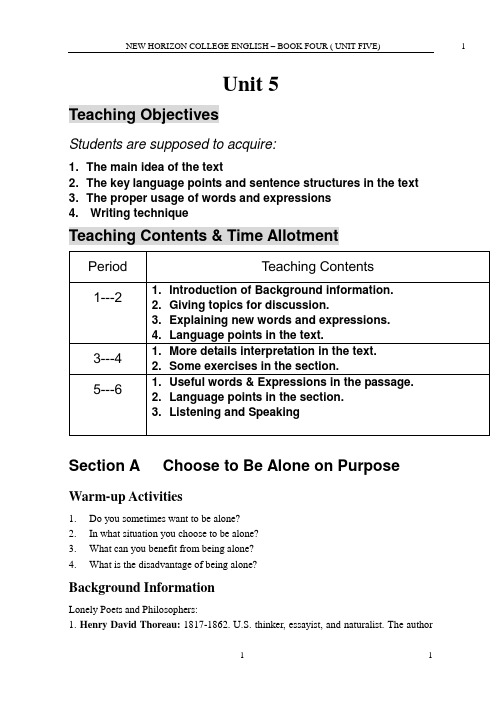
Unit 5Teaching ObjectivesStudents are supposed to acquire:1. The main idea of the text2. The key language points and sentence structures in the text3. The proper usage of words and expressions4. Writing techniqueTeaching Contents & Time AllotmentSection A Choose to Be Alone on Purpose Warm-up Activities1. Do you sometimes want to be alone?2. In what situation you choose to be alone?3. What can you benefit from being alone?4. What is the disadvantage of being alone?Background InformationLonely Poets and Philosophers:1. Henry David Thoreau: 1817-1862. U.S. thinker, essayist, and naturalist. The authorof WaldenThoreau's House: Copied by Charles H. Overly from a drawing done by Thoreau's sister, Sophia.Famous quotations by Henry David ThoreauThe youth gets together his materials to build a bridge to the moon, or, perchance (偶然, 恐怕), a palace or temple on the earth, and, at length (最后), the middle-aged man concludes to build a woodshed (贮放柴薪的木棚) with them.Books are the treasured wealth of the world and the fit inheritance (遗传, 遗产) of generations and nations.Books, not which afford us a cowering (畏缩, 退缩) enjoyment, but in which each thought is of unusual daring (大胆的); such as an idle man cannot read, and a timid one would not be entertained by, which even make us dangerous to existing institution--such call I good books.If you have built castles in the air, your work need not be lost; that is where they should be. Now put the foundations under them.The heart is forever inexperienced.There is no remedy for love but to love more.2. John Milton: 1608-1674. English poet, one of the greatest poets of the English language.Milton was born in London on December 9, 1609 as the son of a wealthy notary (公证人). He was educated at St. Paul's School. Milton received a Master’s degree from Cambridge University in 1632. In 1638, he undertook a European tour where he met many of the major thinkers of the day, especially in Italy.On his return to England, Milton became a Puritan (清教徒), and an opponent of the Catholics and of the Stuarts (英国斯图亚特王室). He was also an ardent (热心的, 热情洋溢的) polemicist (善辩论者), a follower of Cromwell (克伦威尔), and the latter's foreign language secretary. In 1652 he became completely blind. His first wife died in 1652 and he remarried in 1656.After the restoration of the Stuarts he suffered considerable persecution (迫害). He withdrew from active participation in politics and concentrated on his poetry. Paradise Lost was published in 1667, followed by Paradise Regained and Samson Agonistes in 1671. Among other popular works by Milton are the elegy (悲歌, 挽歌) "Lycidas", Comus , a masque (假面舞会), and the companion pieces "L'Allegro" and "Il Penseroso."3. William Wordsworth: 1770-1850. British poet, who spent his life in the Lake District of Northern England. Wordsworth’s personality and poetry were deeply influenced by his love of nature, especially by the sights and scenes of the LakeCountry, in which he spent most of his mature life. A profoundly earnest and sincere thinker, he displayed a high seriousness tempered (调节) with tenderness and a love of simplicity.PreviewThe patterns of personal relationships are changing across the globe. Traditional families and friendships are giving way to more modern interrelationships. In the following articles, the writers present a range of practices that characterize this period of relational and familial change; living alone, sharing a room with others and arranged marriage. Passage A looks at two contrasting sides of solitude: the American hero or literary giant who chooses to be alone and how solitude is seen as promoting both a strong character and creative inspiration and, how individuals feel about and react to loneliness that is not of their own choosing. The second passage discusses the problems that can arise when college students have to share a dormitory with each other. Differences in preferred lifestyles can often lead to irritation and tension and can occasionally explode into violence.New Words1. deer n. [C]a large, grass-eating animal, the male of which has antlers 鹿a herd of deer/wolves/cattle 一群鹿a flock of sheep/birdsa school of fisha swarm of bees2. tame: v. 1. make sb. or sth. easy to control 制服,控制并利用tame a river 治理河流Atomic energy has been tamed and harnessed for useful work.原子能已被控制并得到实际应用。
新视野大学英语4第三版unit5课文教案
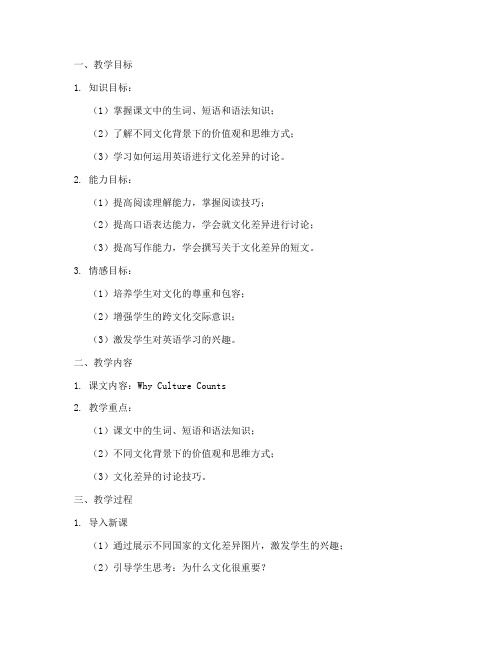
一、教学目标1. 知识目标:(1)掌握课文中的生词、短语和语法知识;(2)了解不同文化背景下的价值观和思维方式;(3)学习如何运用英语进行文化差异的讨论。
2. 能力目标:(1)提高阅读理解能力,掌握阅读技巧;(2)提高口语表达能力,学会就文化差异进行讨论;(3)提高写作能力,学会撰写关于文化差异的短文。
3. 情感目标:(1)培养学生对文化的尊重和包容;(2)增强学生的跨文化交际意识;(3)激发学生对英语学习的兴趣。
二、教学内容1. 课文内容:Why Culture Counts2. 教学重点:(1)课文中的生词、短语和语法知识;(2)不同文化背景下的价值观和思维方式;(3)文化差异的讨论技巧。
三、教学过程1. 导入新课(1)通过展示不同国家的文化差异图片,激发学生的兴趣;(2)引导学生思考:为什么文化很重要?2. 预习课文(1)学生快速浏览课文,了解文章大意;(2)教师提问,检查学生对课文内容的掌握情况。
3. 课文讲解(1)教师讲解课文中的生词、短语和语法知识;(2)分析课文中的文化差异,引导学生思考;(3)通过提问、讨论等方式,帮助学生深入理解课文内容。
4. 练习活动(1)词汇练习:让学生根据课文内容,完成词汇填空、翻译等练习;(2)阅读理解:让学生阅读相关文章,了解文化差异;(3)口语练习:让学生就文化差异进行讨论,提高口语表达能力。
5. 写作训练(1)教师讲解写作技巧,如:引言、正文、结论等;(2)布置写作任务:让学生撰写一篇关于文化差异的短文;(3)学生完成写作任务,教师批改并给予反馈。
6. 总结与反思(1)教师总结本节课的教学内容;(2)引导学生反思:通过本节课的学习,自己对文化差异有了哪些认识?四、教学评价1. 课堂参与度:观察学生在课堂上的发言情况,了解其对文化差异的认识;2. 作业完成情况:检查学生完成写作任务的质量;3. 考试成绩:通过单元测试,了解学生对本节课教学内容的掌握程度。
新视野大学英语第四册第五单元课件
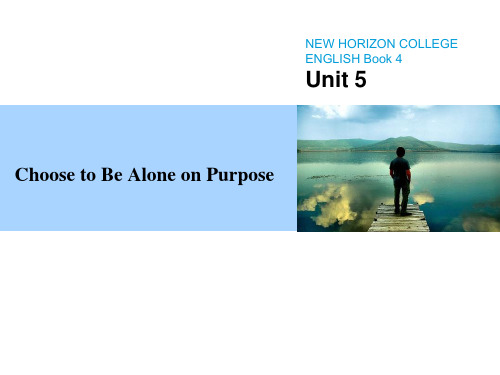
5/14/2012
Questions for Roommate Agreements
• What time do you go to bed? • What time do you usually wake up? • Can lights be on when someone is sleeping? Which lights (bathroom\desk\main)? • Are there going to be study hours? What time? • Can I have guests in the room during study hours? • How will you share the common space of the room (living room, bedroom and main room)? • Will you purchase items for the room together? How will you share these items? • Can we have overnight guests? How often? • Can overnight guests sleep in another roommate’s bed if that roommate is out for the night? Does it need prior permissions ? • What should be done when someone continuously violates tenets of the contract? • Who should be involved in making that decision? Who should be informed?
- 1、下载文档前请自行甄别文档内容的完整性,平台不提供额外的编辑、内容补充、找答案等附加服务。
- 2、"仅部分预览"的文档,不可在线预览部分如存在完整性等问题,可反馈申请退款(可完整预览的文档不适用该条件!)。
- 3、如文档侵犯您的权益,请联系客服反馈,我们会尽快为您处理(人工客服工作时间:9:00-18:30)。
Teaching Planning & Teaching LecturesNew Horizon College English IVUnit 51.教学目标及基本要求:Objectives:Students will be able to:1)Grasp the main idea (that it would be ideal if we can strike a balance between theChinese and the Western learning styles) and structure of the text (introduction of the topic by an anecdote—elaboration by comparison and contrast);2)Appreciate the difference between comparison and contrast, as well as different ways tocompare and contrast(point-by-point method or one-side-at-a-time method);3)Master the key language points and grammatical structures in the text;4)Conduct a series of reading, listening, speaking and writing activities related to thetheme of the unit.2. 教学重点及难点:Important language points in the text:3. 教学容的深化及拓宽:Students conduct a series of reading, listening, speaking and writing practice to deepen their understanding of the points taught in class.4. 教学方式及在教学中应注意的问题:A combination of traditional teaching methods with the communicative approach will beadopted. Special attention should be paid to classroom interaction. Give students time to adapt to the new teaching mode in the university that are quite different from the one they were used to in the middle school. More encouragement is needed and more guidance will be given to them in their extracurricular study.5. 教学容及学时分配:Time allotment:1st period: pre-reading; text organization2nd period: while-reading (Paras 1-5)3rd period: while-reading (Paras 6-13)4th period: while-reading (Paras 6-13 continued, Para 14)5th period: post-reading activities (Debate; Exercises)6th period: Check on students’ home reading (Text B); Theme- Related Language Learning Tasks)6. 主要参考书目:树棠,全生,2003,《新视野大学英语综合教程4-教师用书》。
外语教学与研究。
新视野大学英语综合教程学习指导国防工业。
新视野大学英语综合教程(学生自学辅导)外语教学与研究。
潘晓燕,2006,《大学英语新四级题型攻略》交大大学英语新要求词汇手册外语教学与研究。
LONGMAN Dictionary of contemporary English 外语教学与研究。
现代英语用法词典外语教学与研究。
7. 思考题和习题:《新视野大学英语读写教程4》第5单元Text A后的所有习题阅读第5单元Text B,完成后面的相关练习《新视野大学英语快速阅读4》第5单元及相关练习Writing AssignmentPeriods 1-2Class Planning:1. Teaching Material:Unit 5 Section A2. Teaching Objectives1) Let students grasp the new words and expressions2) Let students master the meaning of each word including English and Chinese meaning.3. Teaching Focussome important new words4. Teaching Methods1) Interactive Teaching2) Communicative Teaching5. Teaching AidsTeaching notes prepared by the teacher6. Time Allotment:1) Pre-reading Tasks (25’)2) While-reading Tasksa) Cultural Notes (5’)b) Questions & Introduction (10’)c) Explanationof new words (35’ )3) Post-reading TasksAfter-text Exercises (5’)7. Assignment:1) Master new words & phrases.2) Do after-text exercises.8. ProcedureStep 1 Revision : Dictation of words and phrases of section B of Unit 4Step 2 IntroductionPreview of unit 5The patterns of personal relationships are changing across the globe. Traditional families and friendships are giving way to more modern interrelationships. In the following articles, the writers present a range of practices that characterize this period of relational and familial change:living alone, sharing a room with others and arranged marriage. Passage A looks at two contrasting sides of solitude:the American hero or literary giant who choose to be alone and how solitude is seen as promoting both a strong character and creative inspiration and, how individuals feel about and react to loneliness that is not of their own choosing. The second passage discusses the problems that can arise when college students have to share a dormitory with each other. Differences in preferred lifestyles can often lead to irritation and tension and can occasionally explode into violence. Passage C is a personal account of a USA educated Indian woman who, despite having taken on the western value of individualism, still chose to be part of a traditional arranged marriage.Step 3 ExplanationNew words1. solitary a. alone; lonely; without companions 独自的,孤独的e.g. The old man leads a solitary life..老人过着孤单的生活。
2.tame v. 1.make sb . or sth. easy to control 制服,控制并利用e.g. Man has tamed much of nature and made it work for him.人类在很多方面已经征服了自然,使其为自己服务。
2 train an animal or a bird not to be afraid of humans and to be obedient 驯服e.g. It is impossible to tame some animals.有些动物不可能驯化。
a. (esp. of animals)not wild or fierce, either naturally or because oftraining or long involvement with humans. (尤指动物)温顺的e.g. He keeps a tame lion.他饲养着一只驯服的狮子。
3.inspiration. n [U,C] (a person or thing that causes)a feeling of wanting and being able to do sth. good, create a work of art, etc. 灵感,鼓舞人心的人或事物e.g. He late became an inspiration to me.后来他成了鼓励我前进的人。
